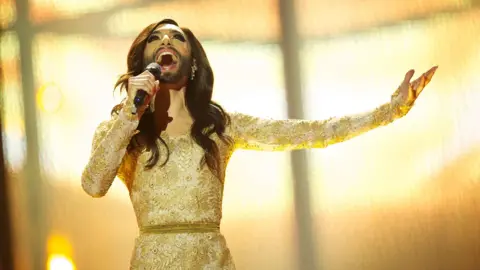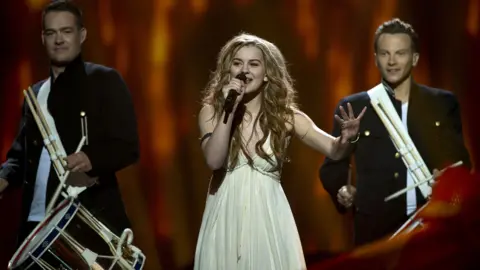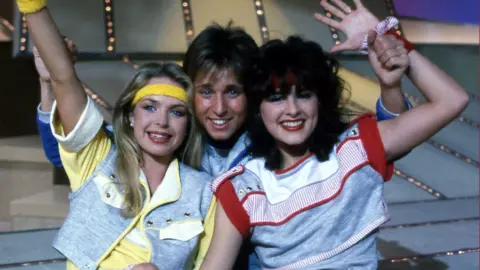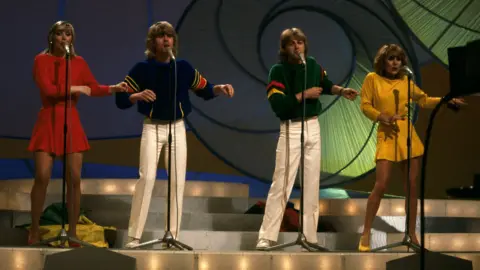 Getty
GettyThe Eurovision Song Contest was watched by around 163 million people last year – meaning there are potentially 163 million different opinions on what makes a perfect entrant.
Do you go for a soulful ballad, guaranteed to leave Europe misty-eyed and full of love and peace?
Or do you opt for a cheesy extravaganza, complete with saucy takes on regional costumes and eye-popping staging that will have the entire continent (and Australia) raving in their living rooms?
The perfect song
 Getty Images
Getty ImagesAccording to Bennett, there is some validity to this, with every Eurovision song falling under six broad lyrical themes: “love, unity, self-assertion, partying, history and songs about making music”.
He adds that “songs of self-assertion or lyrical self-empowerment do very well” – as seen with Austria’s 2014 winner Rise Like a Phoenix (Conchita Wurst).
Keep staging simple and effective
Acts might be tempted to go over the top on staging, but this may not be the way to secure victory, according to our experts.
Songwriter Thomas Stengaard co-wrote Denmark’s 2013 winner Only Teardrops (as well as this year’s UK entry What the Hell Just Happened by Remember Monday). He puts his success down, in part, to its simple staging, which he says made it easy to remember.
“If you asked a kid to draw that staging, they could. It was a girl with no shoes on, two guys playing the drums and a flute guy. Very simple, but it worked.”
 Getty Images
Getty ImagesVocal coach Carrie Grant, who led the UK’s jury in 2014 and came sixth in the contest as part of Sweet Dreams in 1983, agrees.
“There is nothing worse than having an artist whose stage has lots of money but their performance doesn’t warrant it,” she says. “It makes that performance seem worse.”
The 2014 winner (and Carrie’s personal favourite) was Conchita Wurst – the first act to win the contest without backing singers or dancers on stage since 1970.
What made Conchita stand out was that she was a bearded drag queen. Carrie believes Eurovision fans love things that are quirky and that “embrace the LGBT community”.

But she adds that Conchita wasn’t a gimmick but instead “a brilliant singer who could deliver what we call in vocal coaching ‘money moments'”.
The key is key
Minor-key songs increasingly dominate Eurovision.
Bennett debunks the idea that “major equals happy, minor equals sad”, adding that “minor keys are more a shorthand for emotional depth”.
In 2023, 85% of finalists performed in minor keys, according to the Press Association. In the last 20 years, only two major-key songs have won – 2011’s Running Scared (for Azerbaijan) and 2017’s Amar Pelos Dois.
Professor Elizabeth Hellmuth Margulis, a researcher in music cognition at Princeton, highlights source sensitivity – our instinct to associate a song’s sound with its intended context. A few bars of a techno song, for example, and we have a mental image of a dark nightclub, and of the sort of DJ who might perform there.

This means certain minor keys now immediately signal “Eurovision-ness” to audiences.
Remember Monday’s What the Hell Just Happened was written at a songwriting camp, with multiple songwriters working together at a countryside retreat to write the perfect song for this year’s UK act.
The song was intentionally written in a major key to stand out in a sea of minor-key songs – similar to the UK’s 2022 second-place entry, Spaceman by Sam Ryder (B Major).
Have a surprise up your sleeve
Repetition is important to make a song stick in the mind, says Margulis. But songs should avoid being too repetitive. Margulis says that what particularly makes a song catchy is “not only when they are heard repeatedly, but also when they throw in some kind of surprise twist”.
Bucks Fizz’s 1981 winner for the UK, Making Your Mind Up, is a classic example. First, the song changes key, quickly followed by a memorable costume change in which the female singers’ skirts were ripped off to reveal shorter skirts – a joint visual and musical twist.

Earlier Eurovision winners were often mocked for their nonsense lyrics, like Sweden’s 1984 winner Diggi-Loo Diggi-Ley, but Bennett argues this highlights Eurovision’s strong focus on melody.
“Eurovision really needs big melodic hooks. You want people across Europe to be singing that melody. The need for a very accessible, catchy chorus is essential.”
Key changes have long been a way to introduce novelty into Eurovision songs. The 2000s saw multiple winners follow this formula, including Olsen Brothers’ Fly on the Wings of Love for Norway (2000), and Serbia’s Molitva in 2007.
But as Bennett points out, though they are still present in around a fifth of finalists, no song with a final chorus key change has won since Molitva almost 20 years ago.
Stengaard’s song for this year’s UK act Remember Monday is certainly full of surprises. BBC music correspondent Mark Savage said the song featured “a dizzying array of key changes and tempo shifts”.
The song is the songwriter’s answer to the question he asks himself whenever he writes for Eurovision: “How do you stand out in a contest where everyone wants to stand out?”

